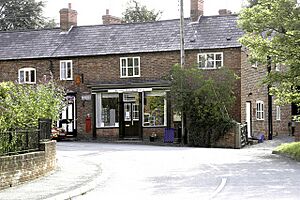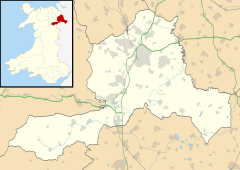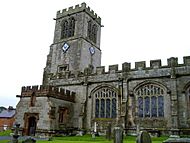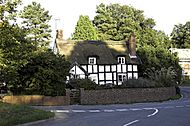Hanmer, Wrexham facts for kids
Quick facts for kids Hanmer |
|
|---|---|
 Hanmer village shops |
|
| Population | 665 (2011 Census) |
| OS grid reference | SJ455396 |
| Community |
|
| Principal area |
|
| Ceremonial county | |
| Country | Wales |
| Sovereign state | United Kingdom |
| Post town | WREXHAM |
| Postcode district | LL13 |
| Post town | WHITCHURCH |
| Postcode district | SY13 |
| Dialling code | 01948 |
| Police | North Wales |
| Fire | North Wales |
| Ambulance | Welsh |
| EU Parliament | Wales |
| UK Parliament |
|
| Welsh Assembly |
|
Hanmer is a lovely village and a wider area, called a "community," located in Wrexham County Borough, Wales. It's a peaceful place with a small population. In 2001, about 726 people lived in the Hanmer community. By 2011, this number was 665. The community includes the village itself and smaller places like Horseman's Green, Halghton, and Arowry.
Contents
A Look Back at Hanmer's Past
Hanmer village is found at the northern end of Hanmer Mere. This "mere" is a type of lake. It's part of the 'Shropshire lake district'. These lakes were formed a very long time ago, during the last ice age.
Early History and Names
Around 47 AD, when the Romans arrived, the area was home to the Cornovii tribe. Their main settlement was at a place called the Wrekin. Later, Hanmer became part of a region called Wreocansaete. This area belonged to the Mercian kingdom.
The name "Hanmer" might have come from "Handmere" or "Hagenamere." It's thought to be named after a Mercian lord from long ago.
The Hanmer Family and Norman Times
When the Normans invaded England, Hanmer was part of ancient Cheshire. It was in a section called the Hundred of Duddeston. Later, it became the land of the important Hanmer family.
This family came from Sir Thomas de Macclesfield. He was an officer for King Edward I. Sir Thomas settled in a Welsh area called English Maelor. His family grew their lands by marrying into important Welsh families.
The Church of St Chad
The first mention of a church in Hanmer dates back to 1110. Sadly, this church was destroyed in 1463 during the Wars of the Roses. It was rebuilt in 1490.
In 1889, fire destroyed the church again. Many old and special parts of the building were lost forever. It was rebuilt between 1892 and 1936. The final part, the chancel, was finished then. The church is named after Saint Chad.
Hanmer's Place in Wales
Before 1974, Hanmer was part of Flintshire. This part of Flintshire was separate from the rest of the county. It was known as English Maelor.
The way people spoke in Hanmer was studied in detail. This was part of the Survey of English Dialects. Hanmer was the only place in North Wales included in this study. Because of this, its local speech was grouped with places in Cheshire.
Important Buildings to See
Hanmer has several old and interesting buildings. Many of them are "listed," which means they are protected because of their special history or architecture.
- Halghton Hall – This is a very important house, listed as Grade I.
- Saint Chad's Church – The church itself is Grade II* listed. Its churchyard gates and the cross in the churchyard are also Grade II* listed.
- Bettisfield Park – This is a country house, also listed as Grade II*.
- Hanmer War Memorial – This memorial is listed as Grade II*.
- Magpie Cottage – This charming cottage is listed as Grade II.
People Connected to Hanmer
Many interesting people have lived in or had ties to Hanmer over the years.
- Dafydd ab Edmwnd (around 1450–1497) – He was a famous Welsh poet from the Middle Ages. He was born in Hanmer.
- Margaret Hanmer – She was the daughter of Sir David Hanmer. She married the famous Welsh leader Owain Glyndŵr around 1383.
- Thomas Hanmer – A town in New Zealand, called Hanmer Springs, is named after him.
- Lorna Sage – She was an author who wrote the book Bad Blood. This book won an award in 2000. Lorna grew up in Hanmer in the 1940s and 1950s. Her book is about her grandfather, who was the vicar (a type of priest) at St Chad's church.
- Richard Steele (1629–1692) – He was a nonconformist theologian and served as a rector (church leader) in Hanmer from 1650 to 1666.
- R. S. Thomas (1913–2000) – This famous poet was briefly a curate (a junior priest) in Hanmer from 1940 to 1942.
 | Jackie Robinson |
 | Jack Johnson |
 | Althea Gibson |
 | Arthur Ashe |
 | Muhammad Ali |




